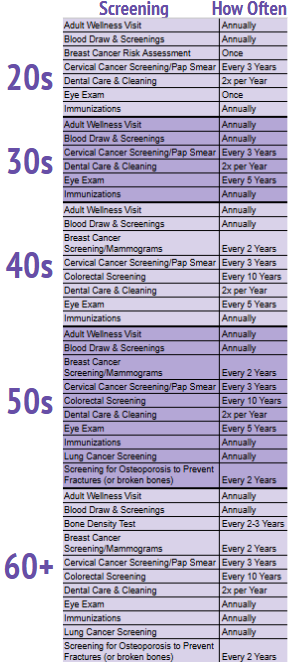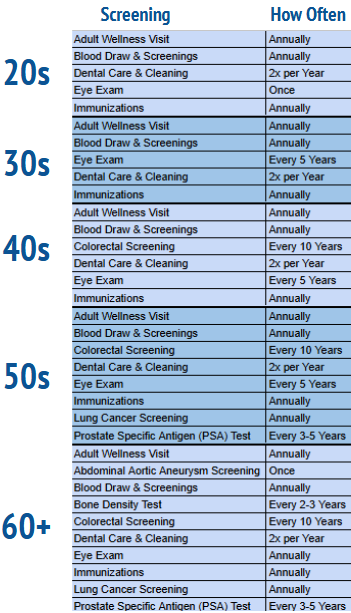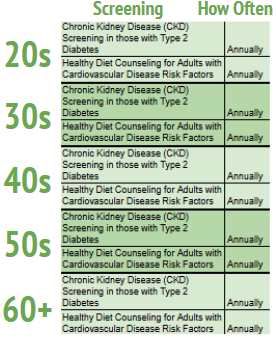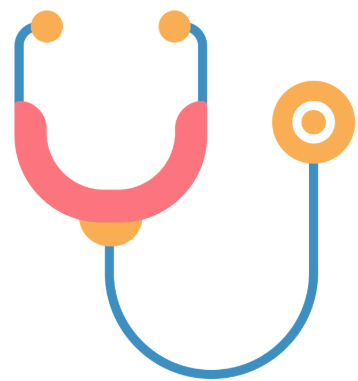
Taking care of your health is one of the most important things you can do, no matter how old you are.
This page includes general health screening recommendations based on your age and sex. If you have a family history of cancer or other health conditions, you may need different or more frequent screenings.
Be sure to discuss your health history with your provider to ensure you’re getting the right screenings and treatment. Keeping healthy is a partnership with your provider, and they may recommend other screenings based on your age, lifestyle, or risk factors. Being open about behaviors that may affect your health will help your provider give you the best care.
Need to find a medical provider, hospital, clinic or mental health provider?
To find a provider use this “Provider Locator” tool link to find someone in your area or scan the QR code using the camera on your phone.

Take advantage of your Wyoming Medicaid benefits to be the healthiest version of YOU!
Check out the video clip below to learn more.
Want to check your coverage for what screenings and care is covered by your Wyoming Medicaid benefits?

Check your benefits by looking at the Member Handbook – click HERE – or use your phone to scan the QR code. You can also call the Wyoming Medicaid Customer Service Center at 855-294-2127 to check on what is covered under your health plan.

Female Preventive Care Recommendations
Here are some important preventive care recommendations for women to help maintain good health at every stage of life.


Male Preventive Care Recommendations
Here are some important preventive care recommendations for men to help maintain good health at every stage of life.


Chronic Health Preventive Care Recommendations
If you have a chronic health condition, there are extra screening recommendations for preventive care you and your doctor can consider in addition to the ones listed for your sex and age.


Pregnancy Preventive Care Recommendations
For a healthy pregnancy, be sure to schedule all the recommended preventive care based on your age, along with the ones listed here:


Adult Annual Wellness Visit Overview
Annual wellness visits are the foundation for good health and going to your doctor is important – even if you’re not feeling sick! At your annual wellness visit, your healthcare provider will take a comprehensive look at your overall health and well-being.

Expect a review of your medical history, current medications, and any changes in your health since your last visit. Your provider will check vital signs like blood pressure, heart rate, and weight, and may conduct screenings for conditions such as diabetes, high cholesterol, or certain cancers based on your age and risk factors. They’ll also discuss vaccinations, lifestyle habits, and any necessary lab tests.
This is a great time to ask questions about your health, address any concerns, and set health goals for the year ahead!
Adult Annual Wellness Visit Video Clip
Curious about what happens at your yearly wellness check-up? It’s a deep dive into your overall health! Check out the video below to discover more.
Advocate for Your Health
Don’t be shy at your doctor’s appointment. It’s important to ask questions and talk about your health. Writing down any symptoms or problems beforehand, even the little things, can help you remember everything. If your doctor says something you don’t understand, feel comfortable asking them to explain it again in an easier way. You deserve to understand what’s going on with your health.
Want to get the most out of your healthcare and feel truly heard by your providers? This short video reveals key strategies for effectively advocating for your health, leading to better understanding and better care.
What are these preventive care screenings for?
Do you have questions about the preventive care recommendations that are listed in the tables above by age and sex? In the list below, you’ll find a full list of the recommended preventive screenings and an explanation for what they are and why they matter for your ongoing health.
Abdominal Aortic Aneurysm Screening
An abdominal aortic aneurysm is a bulge in a large blood vessel (the aorta) in the belly that can be dangerous if it bursts. The USPSTF (U.S. Preventive Services Task Force) recommends a one-time ultrasound screening for men aged 65 to 75 who have ever smoked, as this is the group most at risk. The screening is non-invasive, quick, and can help doctors detect an aneurysm before it becomes dangerous.
Adult Wellness Visit
Annual wellness visits are important for staying healthy, even if you’re not sick! During your visit, your doctor will check your overall health by looking at your medical history, medications, and any changes since your last visit. They will check your blood pressure, heart rate, weight, and may test for things like diabetes, high cholesterol, or cancer. They’ll also talk about vaccines, healthy habits, and any needed tests. It’s a good time to ask questions, share any concerns, and set health goals for the year!
Bone Density Test
A Bone Density Test checks for osteoporosis, a condition that makes your bones weak and more likely to break.
Breast Cancer Risk Assessment
Doctors check for breast cancer risk in women with a family history of cancer or certain genes (like BRCA1/2). They use a questionnaire to see if you might have a higher risk based on your family history or genes. If your answers show a high risk, you should talk to a genetic counselor, who may suggest a test to check for the BRCA1/2 gene.
Breast Cancer Screening/Mammograms
A mammogram is a special X-ray that checks for breast cancer. Some doctors may have mammography equipment in their office, while others might refer you to a special clinic for the test.
Breastfeeding Support
Breastfeeding support is important for new moms after giving birth. It helps them learn how to breastfeed correctly, making it easier for both mom and baby. Doctors give advice on how to hold the baby, how often to feed, and how to know if the baby is getting enough milk. They can also help with problems like sore nipples or low milk supply. Support makes breastfeeding more successful and helps moms feel confident caring for their babies.
Calculate Body Mass Index (BMI)
BMI is a number that helps measure if someone is at a healthy weight for their height. It’s calculated by dividing a person’s weight in kilograms by their height in meters squared. Adults with a higher BMI (30+) should work with their doctor on ways they can improve their health.
Cervical Cancer Screening/Pap Smear
A Pap smear is a test to check for cervical cancer by looking at cells from the cervix (the lower part of the uterus).
- For women ages 21 to 29: It’s recommended to get a Pap smear every 3 years.
- For women ages 30 to 65, there are a few options for screening:
- Every 3 years with just a Pap smear.
- Every 5 years with a test for high-risk HPV (a virus that can cause cervical cancer)
- Every 5 years with both a Pap smear and HPV test (this is called cotesting).
A pelvic exam is often done along with the Pap smear. During a pelvic exam, a doctor checks your reproductive organs (like your ovaries, uterus, and cervix) for any problems. It’s a quick exam where the doctor gently feels the abdomen and uses a tool to look inside the pelvic area.
Chlamydia and Gonorrhea Screening
Chlamydia and gonorrhea are infections spread by sexual contact. They might not show any symptoms, so it’s important to get tested even if you feel fine. The test is quick and painless, usually with a urine sample or a swab. If you’re infected, doctors treat it with antibiotics to help you feel better.
Cholesterol Screening
Cholesterol Screening is a test that checks the amount of lipids (fats) in your blood. High cholesterol can increase your risk for heart disease. If you have higher risk factors, like a family history of heart disease or high cholesterol, your doctor may recommend getting tested more often.
Chronic Kidney Disease (CKD) Screening
Chronic Kidney Disease (CKD) screening is important for people with Type 2 diabetes because high blood sugar can damage the kidneys over time. Early detection can help prevent more serious kidney problems by allowing doctors to provide treatment and advice to manage blood sugar levels and protect kidney health.
Colorectal Screening
Colorectal screening is a test to check for colorectal cancer (cancer in the colon or rectum). There are different types of screening, and how often you need it depends on the type:
- Colonoscopy: This test looks at the entire colon to check for cancer or precancerous polyps. The doctor uses a special camera to look inside. It’s usually done every 10 years.
- Cologuard: This is a kit you use at home to test for signs of colorectal cancer. It’s recommended for people who are at average risk. You send the kit back with a stool sample. This test is done every 1 to 3 years.
Complete Blood Count (CBC)
A Complete Blood Count (CBC) is a blood test that helps doctors check your overall health. It looks at the number of different cells in your blood, like red blood cells, white blood cells, and platelets. A CBC can help find problems like anemia, infections, or even more serious conditions like leukemia. It can also show if there are too many or too few blood cells, which might be a sign of a health issue.
Counseling for Healthy Weight Gain in Pregnancy
Counseling for healthy weight gain during pregnancy is important for both the mom and the baby. Healthcare providers offer guidance on how much weight is healthy to gain based on the mom’s starting weight and the stage of pregnancy. Gaining too much or too little weight can lead to health problems for both the mom and baby. The counseling includes advice on eating a balanced diet, staying active, and making healthy choices to support a safe and healthy pregnancy. Regular support helps moms stay on track with healthy habits and ensures the best outcome for both them and their baby.
COVID-19 Immunization
The COVID-19 vaccine helps protect you from severe illness, hospitalization, and death caused by the COVID-19 virus. You should get an annual booster to keep your protection up-to-date.
Dental Care & Cleaning
Dental care and cleaning are important for keeping your teeth and gums healthy. It’s recommended to visit the dentist for a checkup and cleaning every six months. During these visits, a dentist or hygienist removes plaque and tartar buildup that can’t be removed by brushing alone. They also check for signs of tooth decay, gum disease, and other dental issues.
Depression Screening
All adults, including pregnant or postpartum individuals and those 65+, should be screened for depression. If someone has never been screened, they should be checked. Doctors may also screen more if someone has risk factors, other health issues, or tough life events. Screening can happen during a visit to a new doctor, annual checkups, or if there are signs of depression or suicide risk.
Eye Exam
An eye exam checks for problems with your vision, glaucoma (a condition that damages the eye), and macular degeneration (a condition that affects central vision).
Fall Prevention
Exercise programs to improve balance and strength should be done to make falls less likely. Doctors may also suggest making changes at home to reduce the risk of falls like removing tripping hazards like rugs or adding grab bars in the bathroom.
Gestational Diabetes Screening
Gestational diabetes screening is a test for pregnant women to check if they have high blood sugar. It’s usually done between 24 and 28 weeks of pregnancy. Early detection helps doctors control blood sugar with diet, exercise, or medicine, reducing risks for both mom and baby, like high birth weight or early delivery.
Healthy Diet Counseling for Adults with Cardiovascular Disease Risk Factors
Healthy diet counseling for adults with cardiovascular disease risk factors helps people make better food choices to improve their heart health. For individuals at risk of heart disease, healthcare providers offer advice on eating a balanced diet that includes more fruits, vegetables, whole grains, and lean proteins, while limiting unhealthy fats, salt, and sugars. This counseling helps people understand how their diet affects their heart and overall health.
Hearing Test
A hearing test checks how well your ears are working and can help find early signs of hearing problems.
Hepatitis B Virus Infection in Pregnant Women
Hepatitis B virus (HBV) screening in pregnant women is important to prevent the spread of the virus to the baby. Healthcare providers test for HBV early in pregnancy to see if the mom has the virus. If the test is positive, doctors can take steps to reduce the risk of passing the virus to the baby, such as giving the baby a shot of hepatitis B vaccine and a special medicine right after birth.
Hepatitis C Virus Screening
Adults aged 18 to 79 years, including pregnant women, should be screened for hepatitis C (a virus that affects the liver), especially if they don’t already have liver disease. Most adults should only need a one-time test for hepatitis C. However, if you have ongoing risks for the virus, like past or current drug use, you might need to be tested again. Your primary care doctor can help determine how often you may need repeat tests if you’re at higher risk for the virus.
Human Immunodeficiency Virus (HIV) Screening
Adults should be screened for HIV. HIV is a virus that affects the immune system.
Lung Cancer Screening
A special kind of X-ray called low-dose computed tomography (CT) is used to check for signs of lung cancer in those that have a history of heavy smoking and those that quit smoking in the last 15 years. This is done by a referral from a doctor to a specialist who can perform the scan.
Pneumonia Immunization Booster
The Pneumonia booster helps protect you from pneumonia, which is a lung infection. You only need to get the pneumonia immunization booster once.
Prostate Specific Antigen (PSA) Test
The Prostate-Specific Antigen (PSA) test is a blood test used to check for signs of prostate problems, including prostate cancer. PSA is a protein produced by the prostate gland, and higher levels in the blood can indicate issues, though not always cancer. Healthcare providers may recommend the PSA test for men, especially those over 50 or with a family history of prostate cancer. The test helps detect potential problems early, allowing for further investigation and, if necessary, early treatment to manage prostate health.
Screening for High Blood Pressure
Adults should get checked for high blood pressure using a regular blood pressure test at the doctor’s office. If the test shows high blood pressure, the doctor should check it again outside the office to be sure before starting treatment.
- For people with normal blood pressure (less than 120/80 mmHg), it’s recommended to get checked at least once every 2 years.
- For people with blood pressure higher than normal (120-129/80-89 mmHg), checkups should happen more often, usually once a year.
- For people with high blood pressure (130/80 mmHg or higher), the doctor will decide on the best treatment and how often to monitor it.
Screening for Prediabetes
Overweight adults have or those with obesity should be checked for prediabetes and type 2 diabetes since they are more likely to have these conditions. If you have prediabetes, the doctor should help you find ways to prevent it from turning into diabetes, like recommending healthy lifestyle changes or treatments.
Screening for Rh(D) Incompatibility
This is a test done during pregnancy to check if the mother’s blood type is Rh-negative and the baby’s blood type is Rh-positive. If this happens, it can lead to problems, as the mother’s immune system may attack the baby’s red blood cells. Healthcare providers test for this early in pregnancy, and if there is a risk, they can give the mother a special injection called Rh immunoglobulin (RhIg) to prevent any issues. Screening and treatment help protect the baby from serious health problems and ensure a healthy pregnancy.
Screening for Drug & Alcohol Use
Adults should be screened for alcohol and drug use during annual checkups. If a person is found to be drinking too much or using drugs, the provider may provide brief counseling or refer them to treatment and support services. This screening helps individuals recognize unhealthy habits and get the support they need to make positive changes.
Sexually Transmitted Infection Counseling
Adults at higher risk for sexually transmitted infections (STIs) should get behavioral counseling. This counseling helps teach people how to protect themselves from STIs and make healthier choices when it comes to sexual activity. It’s often done during an adult annual wellness exam.
Skin Exam
A provider looks at your skin from head to toe to check for signs of skin cancer. This includes checking your scalp, face, trunk, limbs, hands, feet, eyes, and eyelids.
Syphilis Infection Screening
Syphilis infection screening is an important test to check for syphilis, a sexually transmitted infection (STI) that can cause serious health problems to a person or pregnancy if left untreated. It may not show symptoms, so screening helps detect it early. Healthcare providers recommend screening for syphilis for anyone at risk, including sexually active individuals with multiple partners. If the test is positive, treatment with antibiotics can cure the infection and prevent complications like organ damage or the spread to others. Regular screening helps protect overall health and reduces the spread of syphilis.
Take Prenatal Vitamins with Folic Acid
Taking prenatal vitamins with folic acid is an important part of a healthy pregnancy. Folic acid helps prevent birth defects in the baby’s brain and spine, especially in the early stages of pregnancy. Healthcare providers recommend that women start taking prenatal vitamins with folic acid before they get pregnant and continue throughout the pregnancy. These vitamins also provide other essential nutrients that support the health of both the mom and the baby, helping ensure a healthy pregnancy and fetal development.
Tetanus Booster
The tetanus booster helps protect you from tetanus, a serious bacterial infection that causes painful muscle spasms, especially in the jaw and neck (called lockjaw). It can be life-threatening if not treated.
Thyroid Stimulating Hormone (TSH) Test
The TSH Test checks how well your thyroid is working. The thyroid is a gland in your neck that helps control your energy, weight, and many other things in your body. The test can help find out if your thyroid is underactive (not working enough) or overactive (working too much), which can affect your health. If you have symptoms like tiredness, weight changes, or trouble sleeping, your doctor might suggest getting a TSH test. It’s often tested in adults during routine checkups, especially if you have a family history of thyroid problems.
Tobacco Cessation
Doctors ask all adults about their use of tobacco, encourage them to quit, and offer help, such as behavioral counseling and FDA-approved medications, to help them stop using tobacco.
What is the United States Preventive Services Task Force (USPSTF)?
Medical providers often follow the USPSTF’s advice because it’s based on solid research. Their recommendations are considered the standard, meaning they are trusted by experts to help keep people healthy. So, when the USPSTF says something is important, it’s because it’s proven to help prevent problems or find them early. Most of the preventive care recommendations on this page come directly from USPSTF.
To learn more about USPSTF recommendations, click HERE.
The United States Preventive Services Task Force (USPSTF) is a group of doctors and health experts who give advice about tests and checkups people should have to stay healthy. USPSTF looks at research to figure out which health tests work the best. For example, they decide when it’s a good idea to get a cancer screening or check your blood pressure.
By using this website, you acknowledge that the State of Wyoming does not endorse any of the sites or services that may be referenced on or linked to on this site. The State of Wyoming will not be responsible or liable for those sites’ content or any loss occasioned by any such content. Other Internet sites or services may have privacy policies or security that differ from the privacy policy or security of the State of Wyoming.
Page last updated on June 23, 2025

